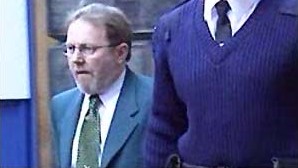Royal Scots corporal Andrew Walker killed three Army colleagues in a payroll robbery in the Pentland Hills, south of Edinburgh, in January 1985. He was jailed for life.
Murders
On January 17, 1985, retired Major David Cunningham, 56, Sergeant Terence Hosker, 39, and Private John Thomson, 25, of the Royal Scots picked up a £19,000 payroll from a Penicuik bank to take to the Glencorse Barracks in Penicuik, Midlothian where all were stationed.
According to the prosecution at his trial, Corporal Andrew Walker, 30, armed with sub-machine gun that he had signed out from an army armoury, forced the trio to drive away from the bank. He shot Serg. Hosker in the chest when he was tackled. Telling Private Thomson to drive along a quiet track to a reservoir, he shot Major Cunningham through the head. Thomson was then forced to unload the bodies of his colleagues before being shot himself in the head and abdomen. The money was never recovered and is thought to be buried in the hills. Walker left several clues in the deep snow and was arrested after a three-day manhunt.
Trial
While on remand for the murders, Walker shared a cell with 18-year-old Andrew Lowden, also on remand. Lowden claimed that Walker was physically violent towards him and threatened to kill Lowden's father and girlfriend, and that Walker had confessed to the murders in lurid detail on the eve of the trial. When Lowden was released, Walker blackmailed Lowden into taking a letter out of the prison, placing the blame for the murders on the Provisional Irish Republican Army. The letter was confiscated by guards and Mr Lowden was therefore later called as a prosecution witness at Andrew Walker's trial.
As a defense, Walker claimed he was driving elsewhere during the murders and that they were the actions of a terrorist organization. He claimed that the shells linking him to the murder weapon were planted.
Walker was found guilty of murder and jailed for life. He was also convicted of theft and for attempting to pervert the course of justice by trying to smuggle the letter out of prison. The judge, Lord Grieve, recommended that Walker should serve at least 30 years for the murders. Lord Grieve noted "This was a calculated crime. The accused, if he was to achieve his purpose, had to kill. I am quite satisfied that the crime was carefully planned, and I am also quite sure that the substance of the evidence given by Walker was a tissue of lies." He called the crimes "callous, brutal and calculated".
Walker's conviction was upheld on appeal, but the sentence was shortened to 27 years as Walker successfully argued in 2002 that he should not have been treated more harshly than other murderers.
Background and motive
Walker was in debt at the time of the murders. He owed £2,000 on a car bill and was about to take delivery of a car worth £8,500. His army colleagues reported that he was a liar and braggart and generally unpopular. After an initially successful career in the army, with three tours to Northern Ireland and a mention in dispatches, he had been having disciplinary issues in the months before the robbery and murders. A commanding officer, Lt Col Fairweather had disciplined him and said: "Unless you get a grip of yourself, I can see you wearing a blue suit and eating porridge".

